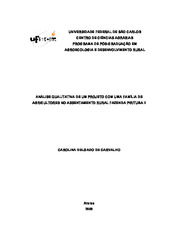Análise qualitativa de um projeto com uma família de agricultores no assentamento rural Fazenda Pirituba II
Abstract
Agroecology emerges as a science in the 70´s of the 20th century. It criticizes convencional agriculture based on a paradigm that passes over social individual connected to natural resources management what brings up serious social and environmental consequences. It proposes an alternative to the subject division of positivist science and incorporates social and ecological view in the agricultural systems analysis. It has a pluri-epistemological nature and makes use of participative metodology with a perspective of dialetics research, breaking up with subject-object power structure of convencional science that says investigator is who knows and the individuals are objects to be analysed. This work tries to break up with this power relationship and to give voice to a family of agriculturists participating in a project developed by Incubadora Regional de Cooperativas Populares (INCOOP/UFSCar) in the Fazenda Pirituba II Rural Settlement. Its purpose is to analyse the agroecological transition this family is passing through and that this project is part of. For it qualitative research methods were used like participant observation, case study and oral life history. Institution disconnection, non-comprehension of the socialhistorical context, loss of global view and leaving off project seemed to be the main factors contributing to the project failure. We conclude that longer supported projects articulating governamental, non-governamental institutions actions and agriculturists supported by an efficient Agroecological Rural Extension public policy must contribute to generate sustainable and autonomous processes in the communities.
